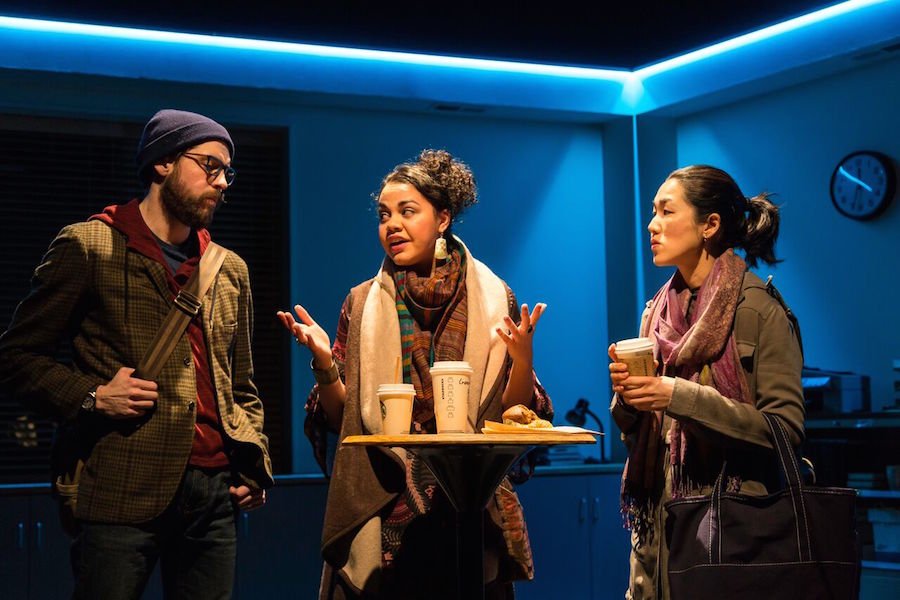
Long Wharf Theatre | Arts & Culture | New Haven | Theater
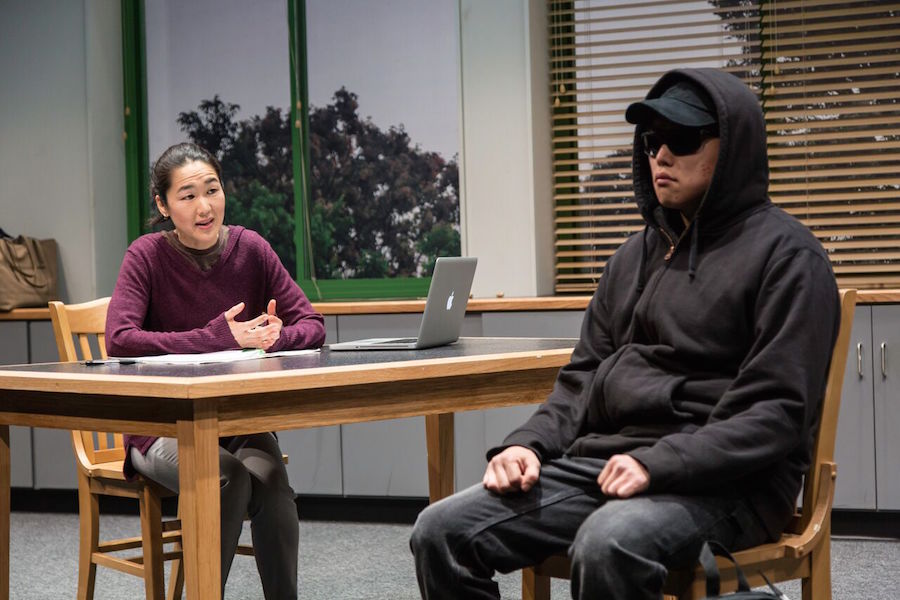 T. Charles Erickson Photos.
T. Charles Erickson Photos.
There’s a green door, the barrier between baring silence and bleeding truth. There’s a window in that green door, cutting off what’s outside from what’s not. There’s a freedom to exist at your own will, to seem as despicable and misunderstood as your heart indifferently desires. You act to emphasize, use silence to speak, write to incite your own torment. You are wonderfully and fearfully made, but all that stands is the fear. You are Dennis.
Last week, Long Wharf Theatre (LWT) opened Office Hour, its latest collaboration with playwright Julia Cho. The play tells the story of Dennis, a college junior with a provocative taste in writing and a propensity for donning all black attire, sunglasses, and a baseball cap as he navigates packed classrooms, school hallways, and college dorm life. It’s a play about stereotype and suspicion, yes. But it is also a story of creating compassion, and learning to sustain it in the midst of a crisis.
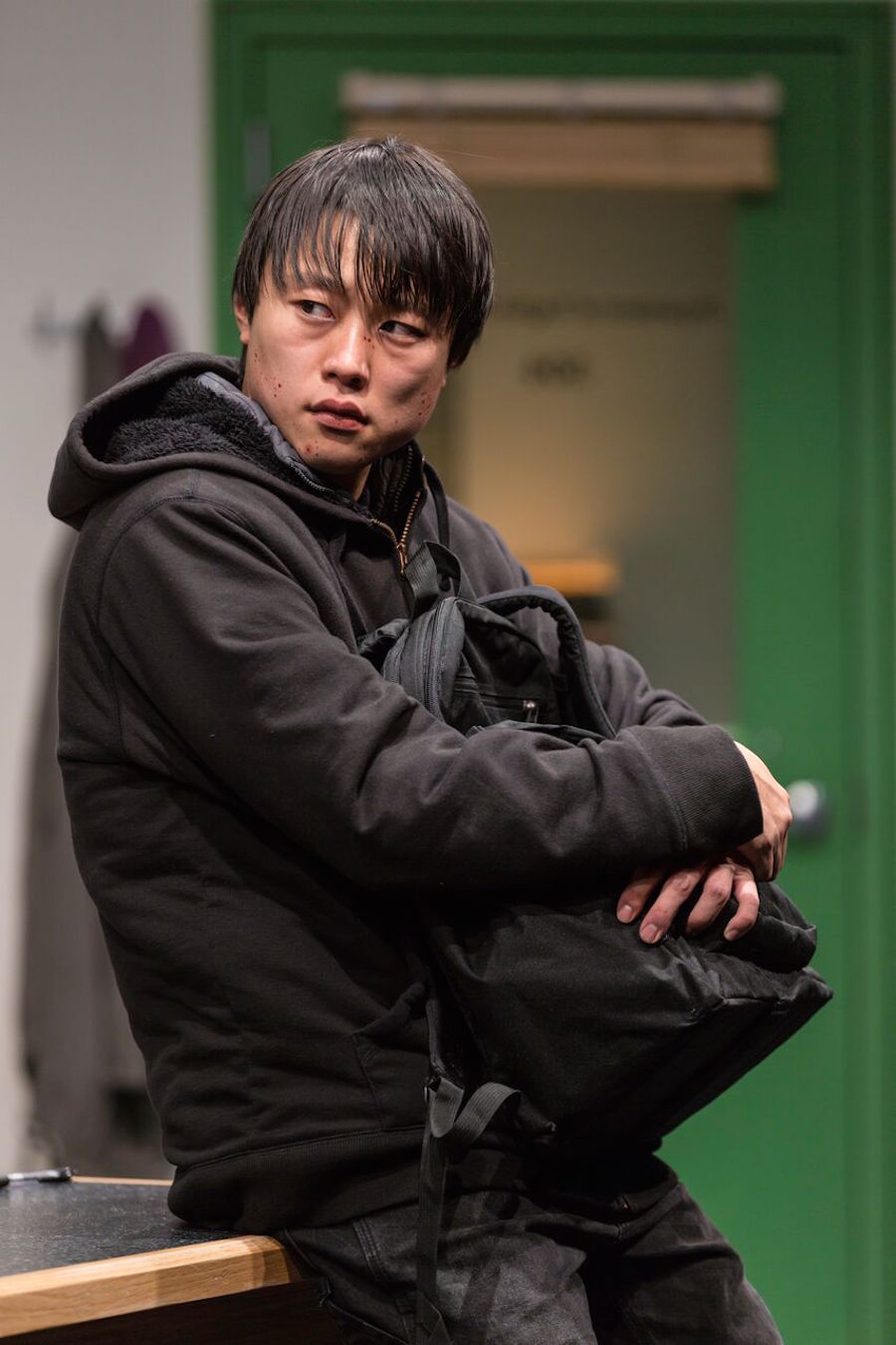
As the house lights go dark, we are introduced to three literature professors; two are very clear about their disdain for the “troubled” Dennis. David (Jeremy Kahn) is merciless in his analysis of Dennis’ character, so loose-lipped on his disgust you’d think he’s seen Dennis committing the heinous crimes on which he writes. He cuts to the essence of the “just enough” educators, those who understand and do well at their job, but cannot see past their own hubris into the human staring back at them.
Echoing his sentiments is Genevieve, a poetry professor who cannot be bothered to help Dennis but is vocal about how taken aback she is by his explicit writing. Kerry Warren, who plays Genevieve, leans right into the role of prim and properly distant professor. As a poetry professor, you’d think her compassion and familiarity with the catharsis of writing would make her more empathetic. Nope. She’s just a good gossip.
The professors huddle around a lone high table as they discuss what might be wrong with Dennis. They constantly glance over their shoulders, haunted by his presence as they prepare Gina, who will soon teach Dennis, for the student’s stark style. Gina listens in disbelief as her counterparts recall frightening tales of Dennis sitting silently in the back of the classroom. And she balks when David says, without hesitation, that they are worried because “he’s a classic shooter.”
To Gina, there must be some explanation. While she is willing to hear her colleagues, she struggles to understand their disconnect. She takes on their words and the fear they incite. Then instead of failing Dennis—a step David so proudly made the semester before—she decides to listen.

When Jackie Chung, the actress who depicts Gina, enters the stage, she’s on. Her nervous energy is palpable as she checks and re-checks the room for absolutely nothing. The audience waits to be disturbed: They ask themselves what will Dennis be like. Will he scare us? Is he a killer-to-be?
Although Gina questions her colleagues opinions of Dennis, it’s clear they’ve influenced her. When he appears in the doorway, she jumps. When he slumps into his seat and stares into nothing, she goes to crack the door instead of closing it. When she speaks, she stumbles, her fear tripping her clarity. She’s getting more than she expected.
There is something to be said about an actor who can deafen you with silence. When Dennis (Daniel Chung) enters the stage, he fills the theater with his isolation. A black baseball cap, thick black sunglasses, and a hoodie hid his face from view. One resounding thump—plopping himself into the chair opposite Gina—and you are staring into the mind of someone who is unseen, and has given up on being heard.
It seems like an eternity until Dennis reveals himself to us. But it’s. a false positive—as the play unfolds, we discover that he’s been himself since the moment he walked into the room. Since before the moment he walked into the room.
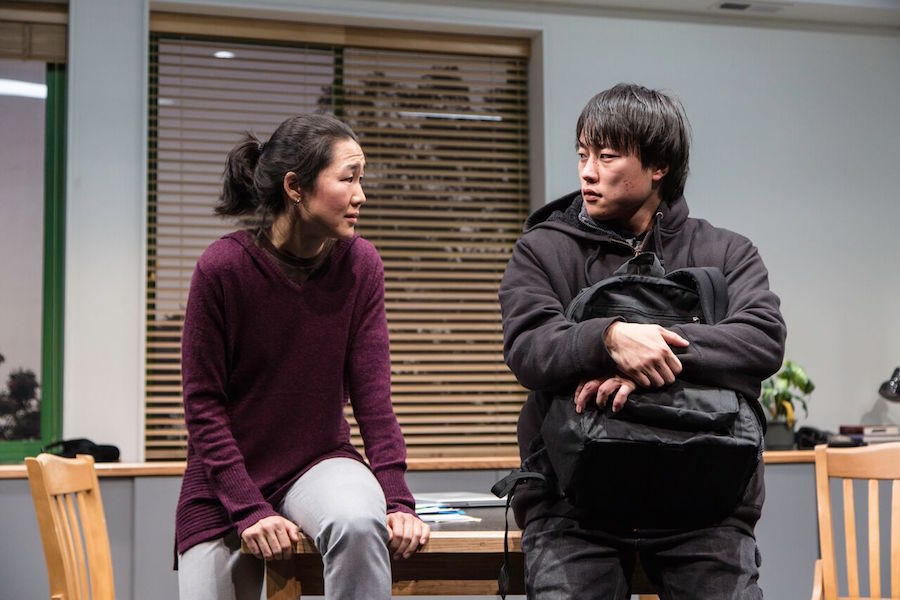
The audience is urged to kindness and revelation by this silence. Dennis is all of us at our most unkind and also most self-hating. In Cho’s universe, it only takes twenty minutes for some change to occur: a professor sees him, and refuses to look away.
Cho is a master of showing—not telling—her audiences about implicit bias, and she does it here with two Asian-American leads. As we explore the relationship between two first-generation writers and their parents, we come a little closer to the heartbeat of Dennis’ pain. It is the song of immigrants, working twice as hard to be disrespected with the idea of never being good enough.
When Dennis’ world shifts into focus, we find it’s one we can be sympathetic to. When a gun is your safety from a world built against you, what does that say about the life you see for yourself? As automatic weapons leave Wal-Mart with few background checks, as those who built this country are spit on by a man with no respect for anyone outside of his tax bracket, what are the possible endings of this story?
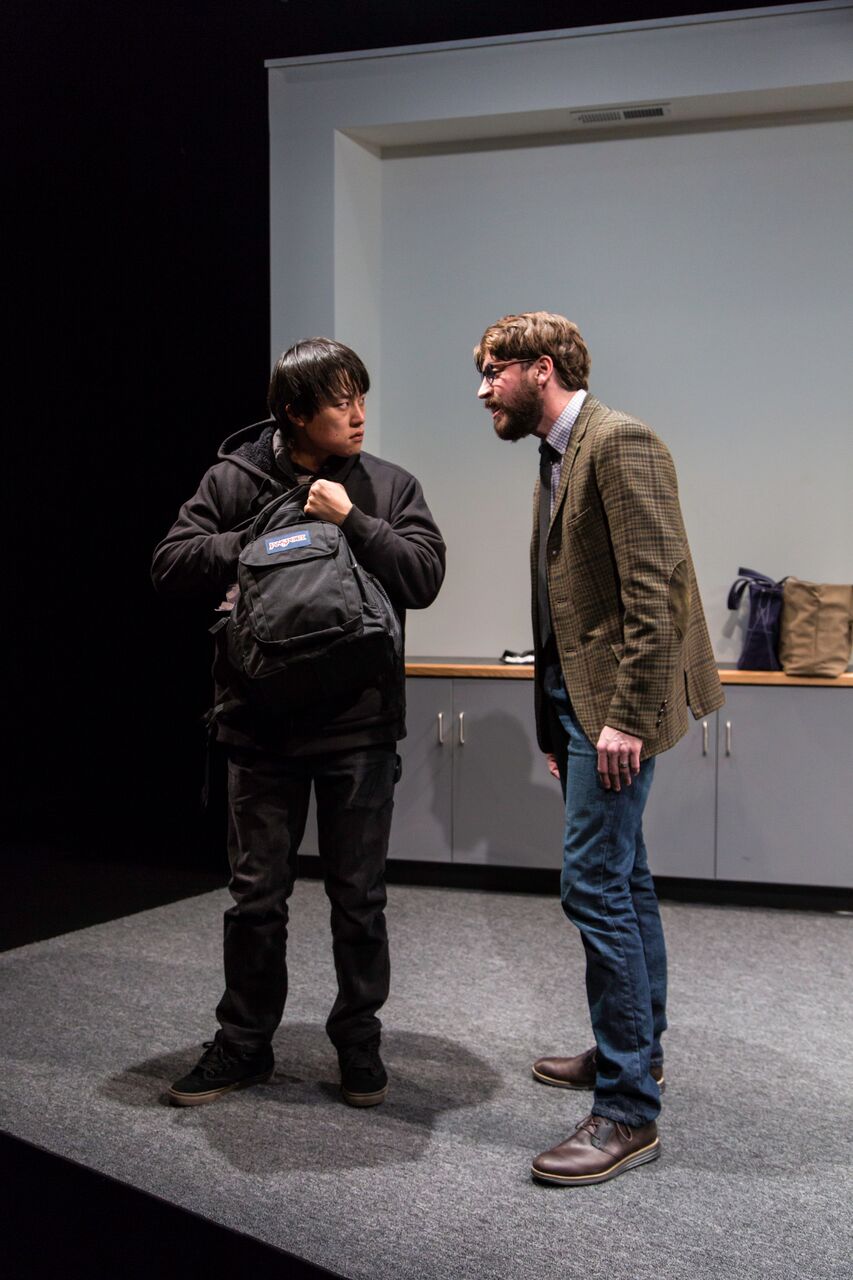
In her third production with Long Wharf, Cho takes the audience from reality to nightmare in the flash of stage light. She has found a great collaborator in director Lisa Peterson, whose beautiful, terrifying and understated staging stand apart from Office Hour’s production at New York’s Public Theatre last year. As Peterson’s Office Hour comes to a head, the audience is introduced to the infinite possibilities of one simple act. In real time, we learn that a flickering gunman that can take the shape of a classmate, teacher, stranger.
Lighting designer Scott Zielinski is unapologetic in his design of Peterson’s vision. At the play’s fastest and most compelling point, the audience finds itself rushing to keep up with the horrifying possibilities of a campus shooting and its perpetrator. Rob Kaplowitz’ original music keeps it on edge—this is not meant to be a touching moment, but a catalyzing one. Holding it all together, Matt Saunders’ set is transformed into a shrine to America’s humanity, as the audience begins to understand the weight of apathy.
And so, Cho brings into question the impact of our empathy. How single moments can compound and push someone past their breaking point, and how listening is more revelatory than thinking you have all the answers. Office Hour is delicate and thorough in its unpacking of Dennis’s trauma, although his pain feels incomplete. What is it like being a disappointment before you can even formulate the word? How can a child compete with genius before he can even speak?
We are left with a play that shock us into opening our mouths to ask “How are you?” instead of “You must be…” There is no mercy in assumptions, no resolve in judgement, and no fear in silence. There are only stories that should be heard and not feared, only people who should be held close and not to a different standard.
In this work, Cho and her colleagues stand around a proverbial coffee table with a set of problems and solutions before them, rising like troubled students. She is patient in this interaction. While most of them—and us—wonder what in the hell is going on with America, Cho simply listens.
Office Hour runs through Feb. 11 at Long Wharf Theatre. For show times and ticket information, check out Long Wharf’s website. To read another take on the show in the New Haven Independent, click here.

